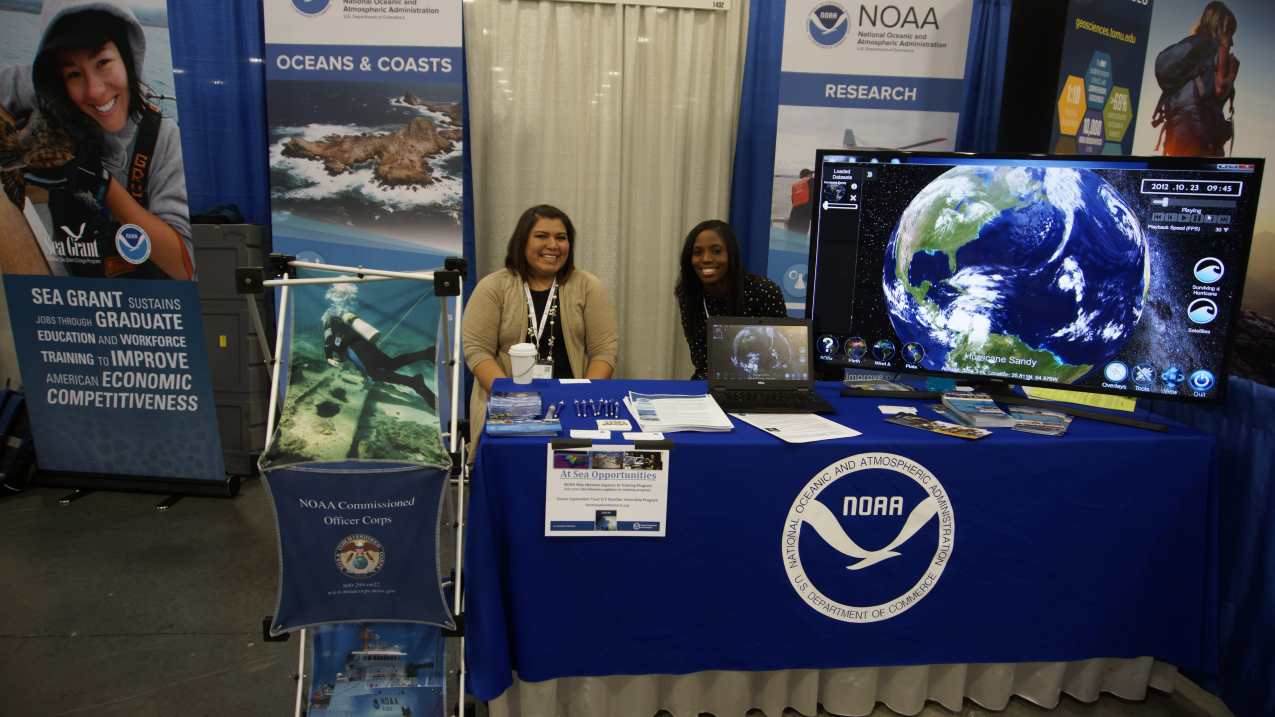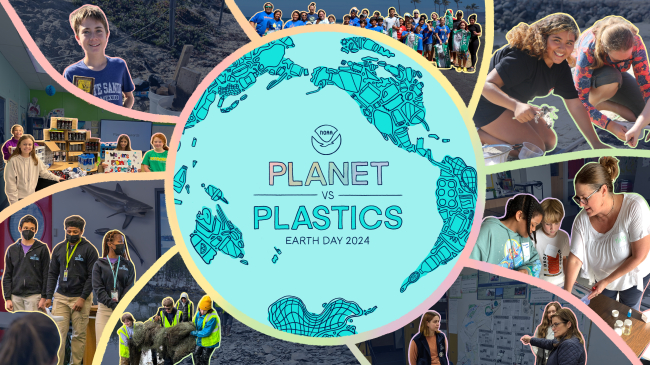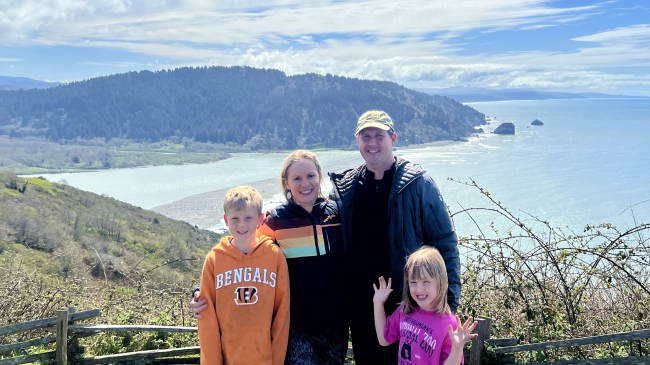Science, technology, engineering, and math (STEM) students and professionals will gather at the Henry B. González Convention Center in San Antonio, Texas, from October 11 to 13 for the 45th annual meeting of the Society for the Advancement of Chicanos/Hispanics and Native Americans in Science (SACNAS).

Jessica Cooper and Carolina Quijada discussing NOAA student opportunities at SACNAS 2017. (Image credit: Jessica Cooper)
SACNAS is a national multicultural and multidisciplinary STEM diversity organization. NOAA will be convening discussions on diversity and inclusion in STEM, helping students take advantage of NOAA's opportunities, and networking with early-career scientists. Here are a few ways to connect with NOAA at SACNAS 2018 offsite link.
1. Attend NOAA’s diversity-related sessions.
NOAA is committed to fostering a diverse workforce in ocean and atmospheric sciences. Members of NOAA’s Diversity and Professional Advancement Working Group and other experts will share their research and perspectives. Stop by our sessions offsite link to join the conversation.
Student and Early Career Opportunities at the National Oceanic and Atmospheric Administration (NOAA)
October 11, 8:45–10:15 a.m., Room 303B · Abstract offsite link
This interactive session will showcase NOAA opportunities for students and young professionals, including internships, fellowships, scholarships, and career development. Experts in the field will also discuss the application process and what it takes to develop a competitive application package.
Interdisciplinary Climate and Weather Science and Services Supporting Community Decision Making
October 11, 10:30 a.m.–12:00 p.m., Room 301C · Abstract offsite link
Governments, businesses, and individuals are planning for climate and extreme event impacts. It is essential to build scientific and social capacity for community decision making to assess risks and opportunities. NOAA’s Climate Program Office will showcase science and services that advance our understanding of Earth’s climate system and inform risk management.
Ocean Science in Service of Societal Needs
October 11, 10:30 a.m.–12:00 p.m., Room 303C · Abstract offsite link
Maintaining the health and biodiversity of the oceans in the face of global change requires an interdisciplinary approach from a variety of STEM disciplines and individuals. This session focuses on the new insights gained when researchers work across disciplinary boundaries to solve real-world problems in service of societal needs.
Belonging: A Documentary Short and Facilitated Conversation on the Academic, Emotional, Social, Political, and Cultural Hurdles to STEM Fields for People of Color
October 12, 8:45–10:15 a.m., Room 221C · Abstract offsite link
The documentary “Belonging” captures the unique socio-emotional experiences of students and faculty of color who are pursuing or have left STEM fields. Through a viewing and facilitated discussion of the film, this session will challenge attendees to reflect on their own journey through STEM and assess whether “belonging” played a significant role.
Exploring Careers in Oceanic and Atmospheric Sciences with the National Oceanic and Atmospheric Administration (NOAA): Opportunities in Science, Service, and Stewardship
October 12, 10:30 a.m.–12:00 p.m., Room 221C · Abstract offsite link
This session introduces students and early career professionals to opportunities in oceanic and atmospheric sciences. Panelists will describe career trajectories, challenges, pitfalls, successes, and accomplishments. They will also connect participants with internships, fellowships, scholarships, and career opportunities.
Navigating the Channels between Ocean Science and Societal Needs: Academia to Agencies, Industry to Non-Profits
October 13, 9:45–11:15 a.m., Room 303C · Abstract offsite link
A career in marine science combines a life of adventure with the opportunity to make a significant societal impact. This interactive, discussion-oriented session will examine the myriad of opportunities in ocean-related fields and the important insider tips that aspiring marine scientists need to be successful.
2. Network with NOAA in the exhibit hall.
We’re hiring! Whether you’re just beginning to explore NOAA sciences or have years of experience, stop by to meet NOAA staff at our exhibit booth offsite link, #1068-1070, on Thursday and Friday. We will be sharing career advice, opportunities, and looking to meet the next generation of NOAA scientists and stewards!
3. Meet our NOAA Scholars.
NOAA’s Ernest F. Hollings undergraduate and Educational Partnership Program with Minority Serving Institutions (EPP/MSI) undergraduate scholars are presenting posters on the research they conducted during their internships. Stop by to meet these up-and-coming experts and learn about their NOAA-supported work.
October 11, 3:30–5:30 p.m., Hall 2Teresa Giandonato, NOAA Hollings Scholar from Colorado Mesa University, spent her summer working in NOAA’s National Marine Sanctuary System. She will present "Variability in Condition Indices of Sand Lance (Ammodytes spp.) on Stellwagen Bank" (Poster 358 offsite link).
Janelle Layton, NOAA EPP/MSI undergraduate scholar from Hampton University, conducted her internship with the National Marine Fisheries Service Marine Mammal Health and Response Program. Learn about her research on the 2017 Annual Marine Mammal Stranding Report (Poster 158 offsite link).
October 12, 1:45–3:45 p.m., Hall 2Grant Voirol, a 2017 NOAA Hollings Scholar studying biology and marine science at the University of Miami, will present "Seasonal Habitat Use of Pacific Spiny Dogfish Based on Archival Tags" (Poster 353 offsite link).
4. Attend the “Dinner & Conversations with Scientists” special event.
A buffet dinner offsite link will be served on Thursday evening from 5:45 to 7:15 p.m. All professional attendees are invited to dine with students and engage in informal round-table discussions about discipline-specific careers. These personal connections can set the stage for ongoing mentorship and support throughout the conference.



